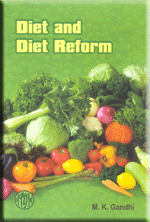
P.O. SEVAGRAM, DIST.WARDHA 442102, MS, INDIA. Phone: 91-7152-284753
FOUNDED BY MAHATMA GANDHI IN 1936
DIET AND DIET REFORM

DIET AND DIET REFORM
Table of Contents
PART-I
- SECTION I: General
- My Faith In Vegetarianism
- The Moral Basis of Vegetarianism
- Diet For Brahmacharya
- Green and Dietetic Ahimsa
- 'Food Faddists'
- Unfired Food Experiment
- Unfired Food
- Unfired Food
- Unfired Food
- National Food
- Minimum Diet
- For Four Rupees A Month
- A Talk to Village Workers
- Minimum Diet
- Plea for More Fruits
- Carrion-eating
- SECTION II : Rice, Wheat and Gur
- SECTION III : Soya Beans and Ground-nuts
- SECTION IV : Green Leaves, etc.
- SECTION V : Milk
- SECTION VI : Ghee and Oil
PART-II
- SECTION I : General
- Precautions Against Ills of The Season (M.D.)
- Dietetic Changes (M.D.)
- Mortification of The Flesh (M.D.)
- Vitamins - I (P. C. Ghosh)
- Vitamins - II (P. C. Ghosh)
- Physiological Basis of Nutrition
- Are you acid? (H. C. Menkel)
- What And How Much To Eat? (H. C. Menkel)
- Question on Diet (H. C. Menkel)
- Improved Diets (A. K.)
- Place of Cereals in Food (I. Amin)
- An Experiment in National Diet (Pyarelal)
- Revealing Figures (A. K.)
- SECTION II : Rice, Wheat and Gur
- The Miracle of Unpolished Rice (M.D.)
- Unpolished v. Polished Rice (Prof. Basu)
- Saving Cereals (D. K. Gupta)
- Useful Suggestion (M. A. Chadray)
- White v. Brown Sugar (M. D.)
- The Havoc of Sugar (M. D.)
- Bad Teeth and Refined Carbohydrates
- Potentialities of Palm Jaggery (Gajanan Naik)
- Nira - A Nutritious Beverage (Gajanan Naik)
- SECTION III : Soya Beans and Ground-nuts
- Warning against Soya Beans (M. D.)
- Soya Beans (M.D.)
- Soya Bean Recipes
- A Soya Bean Book (M. D.)
- The Utility of The Ground-nut (A. K.)
- SECTION IV : Fruit
- The Merit of Amla (A. K.)
- SECTION V : Milks
- Kimmed Milk and Buttermilk (W. R. Aykroyd and S. C. Dasgupta)
- SECTION VI : Ghee And Oil
- Edible Oils (P. C. Ghosh)
- Blindness At A Price (J. C. Kumarappa)
- Nakali Ghee (J. C. Kumarappa)
- SECTION VII : Tea
- Another Rising Menance (J. C. Kumarappa)
- Non-English Words With Their Meanings
About This Book
Written by : M. K. Gandhi
Edited by : Bharatan Kumarappa
First Edition : 5,000 copies, July 1949
ISBN : 81-7229-062-4
Printed and Published by : Jitendra T. Desai
Navajivan Mudranalaya,
Ahemadabad-380014
India
© Navajivan Trust, 1949
Download
Chapter 38: Adulteration of Ghee
Shri Pannalal, an old member of Sabarmati Ashram, is a lover of cattle. He has for years been a lay farmer and dairyman. He has tried to study the cattle question. Very few people realize that conservation of cattle wealth of India is a major economic problem beset with many complexities. Adulteration of ghee has always been one of them. During the last few years it has become growing menace owing to the import of cheap vegetable oil miscalled ghee because of its having been congealed and otherwise processed so as to look like ghee. Shri Pannalal says that middlemen and sellers of dairy products profusely adulterate real ghee and thus undersell the farmer or cattle-keeper. He says that it is impossible for farmers to hold out against this competition if the mischief continues for any length of time, especially as such vegetable ghee is being manufactured in Bombay and elsewhere on a large scale.
Shri Pannalal rightly adds that agriculture without dairying and cattle breeding for draft purposes will be an impossibility if real ghee disappears from the market. Cattle-keeping will then become a luxury instead of a paying occupation. Shri Pannalal, therefore, suggests that drastic measures should be taken to prevent adulteration. I heartily endorse the suggestion. There should be a well regulated public agitation against adulteration, and preventive legislation should be passed if necessary. In addition to the economic this adulteration has a medical aspect which is no less important than the economic. It is well known that vegetable 'ghee' has a much lower protective value than ghee.
From the health point of view, doctors say, vegetable ghee can never be a substitute for real ghee. This is, therefore, a question for corporations, medical men and humanitarian leagues to tackle without delay. If corporations have not adequate powers, they should have them. Shri Pannalal says:
"The remedy is not very difficult if they will to be there. It is quite feasible to make it compulsory by law to add some edible colour or flavour to each and every tin of vegetable ghee, whether imported or produced in India. This will readily distinguish the vegetable product from the genuine ghee and make detection easy. If it is possible to stamp each match box with a Government seal, surely it is not difficult to have every tin of vegetable ghee duly coloured or flavoured similarly."
Segaon,
8-1-1940
Harijan,
20-1-1940